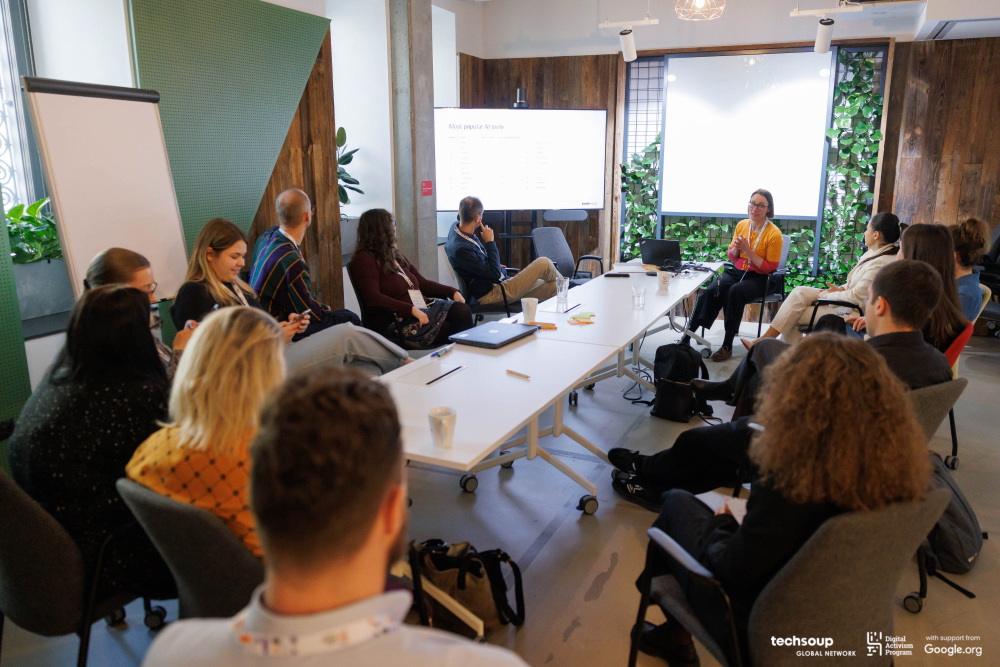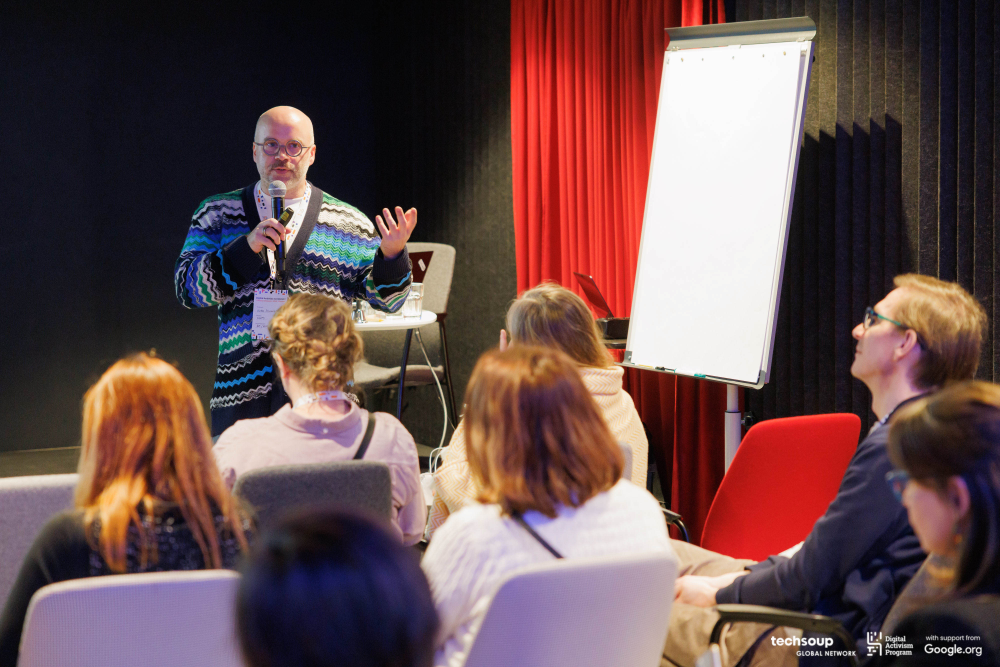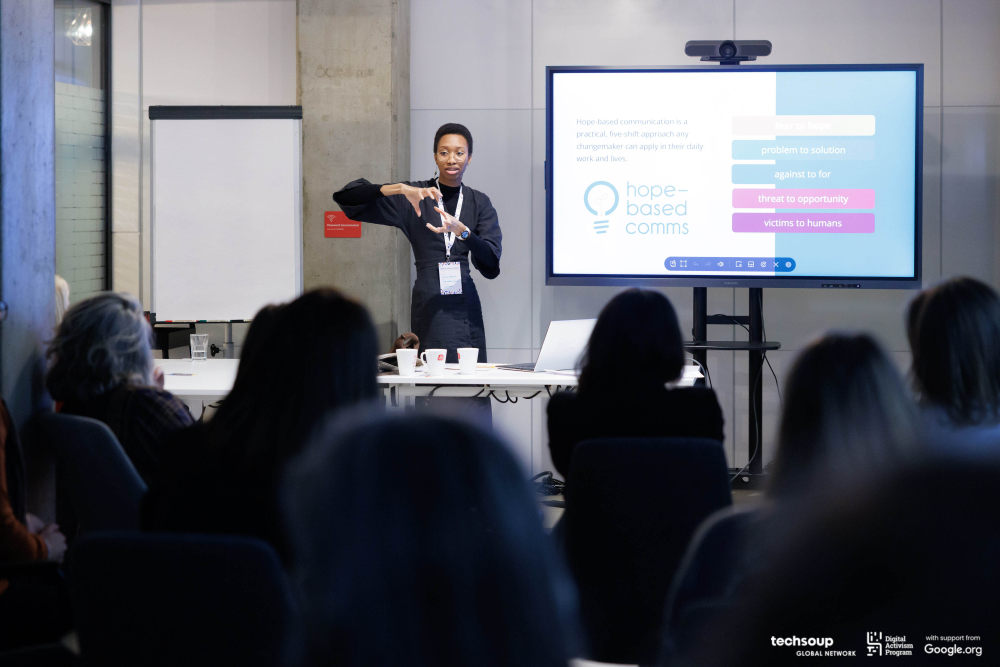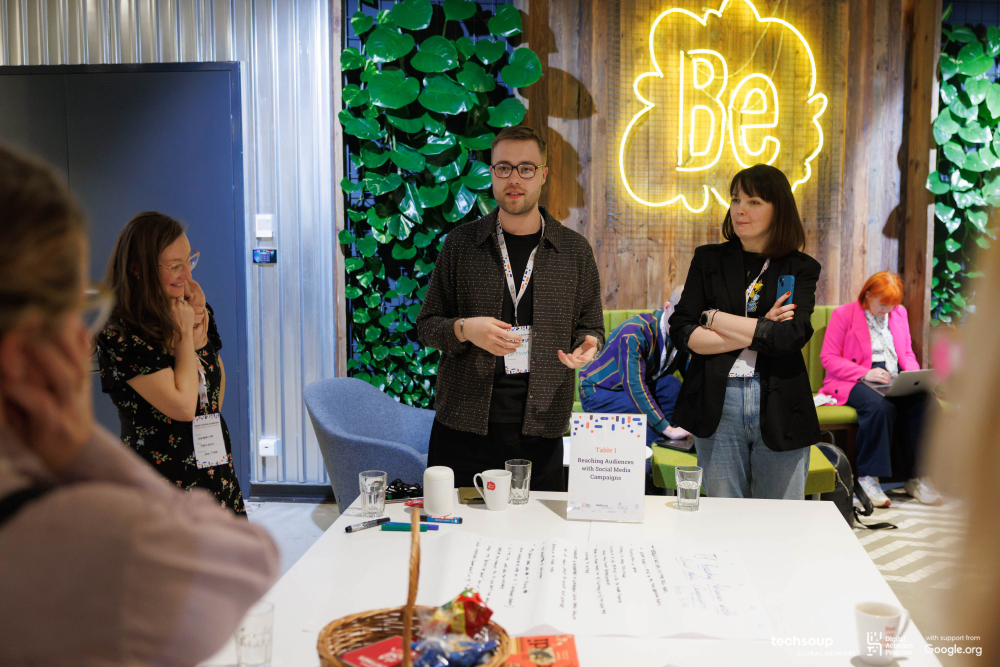Participants took part in hands-on workshops on topics like hope-based communications, data literacy in activism, and the use of AI in nonprofit operations. A dynamic series of peer-led case studies highlighted real-world strategies for reaching audiences, engaging communities, experimenting with new formats, leveraging tech tools, and measuring impact.
▶️ Watch the testimonials video to see what key takeaways were mentioned by our participants and organizers:
Leveraging AI for Civil Society Organizations - workshop
The workshop, led by Maria Makowska from TechSoup Europe, gave participants a practical look at how AI tools can help activists and nonprofit teams work smarter (not harder). Through real-life examples and hands-on prompts, the session explored how AI can support everything from everyday admin tasks to more strategic planning and decision-making (whilst considering AI usage ethics too).
Key takeaways:
Start small, build confidence: Organizations don’t need to be an expert or overhaul an entire workflow. Even small uses of AI (like drafting emails or cleaning up data) can save time and reduce stress.
Think of AI as a teammate: Whether it's helping to brainstorm, write first drafts, or sort through information, AI can act as an assistant, collaborator, or creative partner, depending on how one uses it.

How you ask matters: Good AI results depend on good (and thought-through) prompts. Be clear about what you want, share the right context, and don’t be afraid to go back and tweak your request until you get what you need.
Use the right tools for the job: There are a lot of tools that are already being used by civil society orgs to manage emails, meetings, reports, grant proposals, and more. It’s all about choosing what fits your team’s needs.
Experiment, learn, try out: AI isn’t about getting it perfect the first time. It’s about trying things out, learning what works, and adjusting as you go. It’s a great opportunity to involve your team and learn together.
AI should be used responsibly: AI can be helpful, but it’s not magic or one-size-fits-all. It can be biased or inaccurate, so always review results carefully. Think about privacy, data protection, and how to use it ethically within your organization.
Consider your next step! Whether it’s writing a simple AI use policy or testing a tool on a small project, it’s worth asking: what’s one way we can try this out and learn from it?
Data Literacy & Activism: Tools to Address Bias and Advance Inclusion – workshop
Led by Kuba Piwowar (SWPS University / Centrum Cyfrowe), this session offered participants an insightful introduction to using data for social change. Blending practical know-how with activist principles, the workshop covered what data activism is, why it matters, and how organizations can take the first (or next) step toward using data responsibly and effectively.
Key takeaways:
Data is a tool for change: Whether it’s exposing injustice, making better decisions, or mobilizing communities, data can be a lever for impact if used intentionally.
 You don’t need to be a data expert: Start with what you already have. Use simple tools, keep your process light, and focus on clarity over complexity.
You don’t need to be a data expert: Start with what you already have. Use simple tools, keep your process light, and focus on clarity over complexity.
A good data project starts with a good question: Before collecting anything, define your goal: Are you raising awareness? Influencing policy? Supporting a community? This shapes the entire process.
Storytelling and visualization matter: Data alone doesn’t change minds. Turning numbers into narratives (especially positive and/or hope-based) that people can relate to is essential for advocacy and inclusion.
Data ethics is non-negotiable: Respect for privacy, transparency, consent, and avoiding bias are foundational. Activists should lead by example when it comes to using data responsibly.
Use what’s out there: Public datasets offer rich starting points. No need to reinvent the wheel or start a degree just for that!
It’s a process, not a sprint: From data collection to analysis to building an action plan, effective data activism happens step by step—starting small and scaling with care.
🎧 To learn more, listen to the timely Hive Mind podcast recorded with Kuba Piwowar: Data Literacy and Activism: Tools to Address Bias and Advance Inclusion.
Centering What Matters: A Hope-Based Strategy for Lasting Change - workshop
This hands-on session led by Amina Bouare explored how changing our framing - from fear to hope, from problems to solutions - can transform how activists communicate, plan and execute campaigns, and connect with their target audiences. Participants learned how to develop messages that not only inform but inspire action and resilience. At a time when activists often operate in reactive, high-pressure environments, the workshop offered a refreshing perspective: that clear, values- and hope-driven storytelling rooted in hope can be a powerful antidote to burnout, disillusionment, and apathy.
Key takeaways:
Hope is strategic. It's the belief that a better future is possible if we (or our audiences) act. In activism, it builds momentum, gathers allies, and keeps people going even when change is slow or frustrating;

We choose our framing. Hope-based comms is about shifting from fear to hope, from what we’re against to what we stand for, from victims to humans, from reactive to ready.
Don’t just describe the problem, try showing the solution. People need to know what they can do and what success looks like. That’s how you build a sense of agency.
People are moved by stories, not stats. Highlight lived experiences, joy, and shared humanity - not just urgency and risk. Positive imagery can shift the narrative and open and move hearts.
Messaging isn't about what's popular. Good communication reshapes what's considered possible, normal, and worth caring about. When people can picture the changes, you’re fighting for, they’re more likely to get involved.
Insights from the Experience Market
 During the Experience Market session at the event, participants had a chance to engage in small-group conversations centered around five core themes: Reaching Audiences with Social Media Campaigns, Innovative and Inspiring Formats, Engaging Communities Online, Tools and Technologies, and Measuring Impact. Each table featured civil society organizations from the region who shared practical case studies from their work, offering lessons learned and real-world inspiration. Participants heard from New East (Latvia) and Trans-Fuzja (Poland) on building impactful social media strategies; [H] Brașov (Romania) and Sbunker (Kosovo) on creative and innovative formats for civic engagement and small-scale projects; Wikimedia Polska (Poland) and Kanal 77 (North Macedonia) on fostering online community participation; the Sõna&Tegu team (Estonia) on using AI to track political promises; and the Association Pasaules Dabas Fonds (Latvia) on how to measure digital engagement and campaign impact. The Experience Market proved to be a favorite among attendees - showcasing the strength of peer learning and the diversity of digital activism happening across the region.
During the Experience Market session at the event, participants had a chance to engage in small-group conversations centered around five core themes: Reaching Audiences with Social Media Campaigns, Innovative and Inspiring Formats, Engaging Communities Online, Tools and Technologies, and Measuring Impact. Each table featured civil society organizations from the region who shared practical case studies from their work, offering lessons learned and real-world inspiration. Participants heard from New East (Latvia) and Trans-Fuzja (Poland) on building impactful social media strategies; [H] Brașov (Romania) and Sbunker (Kosovo) on creative and innovative formats for civic engagement and small-scale projects; Wikimedia Polska (Poland) and Kanal 77 (North Macedonia) on fostering online community participation; the Sõna&Tegu team (Estonia) on using AI to track political promises; and the Association Pasaules Dabas Fonds (Latvia) on how to measure digital engagement and campaign impact. The Experience Market proved to be a favorite among attendees - showcasing the strength of peer learning and the diversity of digital activism happening across the region.
Experience Market Spotlight: Tools &Tech
As part of the Tools & Technology table at the Experience Market, the Estonian team behind the Sõna&Tegu (Word & Deed) platform shared how they’re using technology to push back against disinformation and build a more informed public. Presented by Pavel Fleisher from the Estonian Citizen Journalism School NGO, the platform tackles the flood of vague or misleading political narratives by offering verified, searchable, and real-time information about political promises. With support from the Digital Activism Accelerator, they launched two AI-driven tools: Action Radar, which scans media to detect and track political statements using large language models, and a multilingual Election Assistant that helps voters fact-check candidates’ positions during the 2024 European Parliament elections. These tools are empowering Estonian citizens to make sense of complex political messaging and giving journalists and civil society organizations a reliable way to hold leaders accountable. That all to making it harder for disinformation to take hold.
📹 Curious about the Digital Activism Accelerator? Check out this wrap-up video to explore our journey of learning, resilience, and impact throughout Central and Eastern Europe:
The Digital Activism Accelerator wouldn’t be possible without collaboration with a strong network of Partners. TechSoup Europe (Poland) collaborated with Baltic Centre For Media Excellence (Latvia, Estonia), Civic Resilience Initiative (Lithuania), Funky Citizens (Romania, Bulgaria, Moldova), Metamorphosis Foundation (North Macedonia, Serbia, Kosovo), PDCS (Slovakia), and Sdružení VIA (Czech Republic). The project was organized with support from Google.org.
The Digital Activism Accelerator project is a part of TechSoup’s Digital Activism Program - a global initiative empowering civil society actors by providing support, learning opportunities, connections, and tools to enhance digital resilience.
